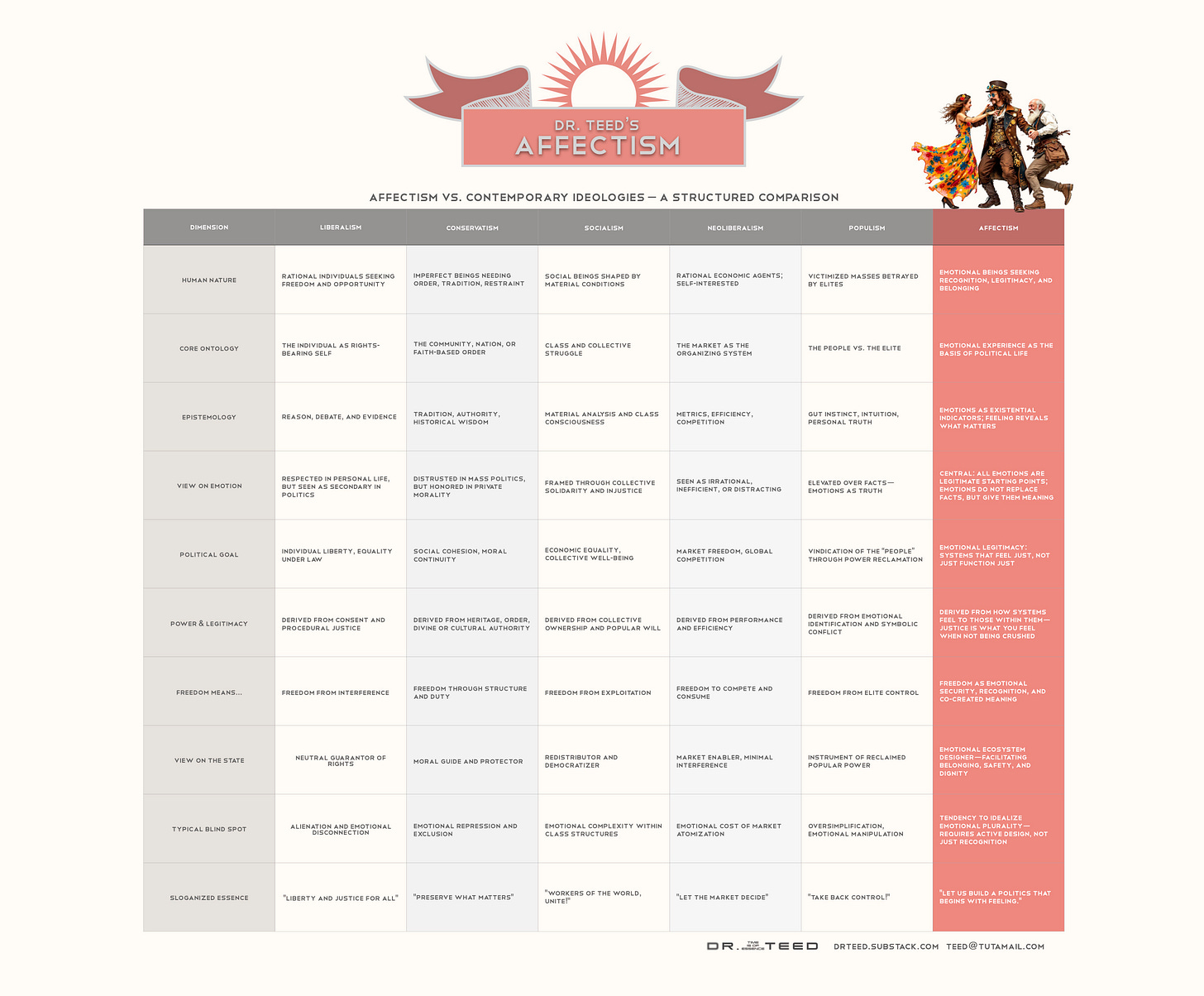I didn’t set out to found an ideology.
In truth, I don’t even know if that’s what this is.
It began as a question. Then a pattern. Then a feeling.
After speaking with minds across centuries—from Plato to Machiavelli, from Rousseau to Weil and Rand, from Smith to Marx—I found myself more disturbed than enlightened. They were all reaching for something essential. But again and again, they left one thing out.
Feelings.
Not in the sentimental sense. But the felt experience of being human—fear, grief, belonging, shame, joy, reverence, need. Everything we emotionally are.
What I came to realize is this: Politics, as we’ve inherited it, is built on an ontological misreading of what human beings are. It treats us as rational actors, or economic agents, or class members, or sovereign individuals. But beneath all that—we are beings who feel first, and think after. And we respond to the world not based on truth alone, but on how this truth feels.
This is where Affectism was born.
What is Affectism?
Affectism is the political recognition that–Emotions are not side effects of political systems. They are the terrain. All emotions are legitimate starting points. Not all lead to just actions, but all reveal unmet needs. Emotions are not truth. But they reveal where truth matters most. Freedom, justice, legitimacy—these are not abstract conditions. They are emotional realities.
We must design our political world not only to function—but to feel human. A different kind of political foundation
Philosophers love to quote Descartes: “I think, therefore I am.” But in this new age—fractured by technocracy, alienation, and emotional repression—that isn’t enough.
I feel, therefore I am.
That’s the starting point of Affectism.
Affectism compared to contemporary ideologies
[Haipa insert: Affectism Comparison Chart]
Visual table comparing Affectism to Liberalism, Conservatism, Socialism, Populism, Neoliberalism. [Pdf version].
What will critics say?
They’ll say this is dangerous. Vague. Unstable.
They’ll say:
“Aren’t you just replacing reason with feeling?”
“Doesn’t fascism use emotions too?”
“If all emotions are equal, how do we distinguish hope from hate?”
They’re not wrong to ask.
But here’s what they miss:
Emotion is not a replacement for truth.
We don’t treat emotion as epistemological proof. We treat it as existential signal. It tells us what matters, to whom, and why. It is not the source of fact—but it is the condition under which facts become meaningful.
Without emotional recognition, even justice will not feel just.
Emotion is the foundation of legitimacy.
A system that is rational but emotionally alienating will be abandoned or weaponized.
Power is felt.
Freedom is felt.
The state is real because we feel safe in it—or are afraid of it.
Emotions are not noise in the political machine. They are the operating condition.
All emotions are legitimate. That doesn’t mean all are justified.
We’re not saying all feelings lead to good actions. We’re saying you cannot address injustice without first listening to the emotional terrain it lives in.
Instead of asking “Is this emotion right?”, we ask:
“What does this emotion reveal about us and our perceived reality? And how can we respond by design, not by repression?”
That’s a better question.
For example
It has often been said that absolute poverty is more important than relative poverty.
But this depends on how you define ‘important.’ If politics is about keeping people alive, perhaps that is true. But if politics is about supporting making life worth living, then relative poverty may be the deeper wound.
Affectism sees poverty not only as what you lack—but as what you are made to feel you’ll never deserve. A system that lifts you from hunger but places you into lifelong humiliation has not yet understood what justice means.
What would this mean in practice?
Emotionally informed policy: Like climate change strategies designed not just on science, but on the emotional fears, fatigue, and losses that prevent action.
Institutions that feel human: Schools, workplaces, businesses, courts, bureaucracies that consider dignity, recognition, and emotional tone—not just output.
Responsive Governance: Not just responsibility via opinion polls, but responsive to the mood of a population. Where feelings of belonging is seen as a fundamental value and asset.
Restorative Justice as a baseline, not an afterthought.
A politics worth feeling
Affectism is not soft.
It is not anti-intellectual.
It is post-alienation. Post-phantasmagoria. Beyond justified rationally, but emotionally driven, violence.
It is a politics that doesn’t seek to win the argument, but to remake the world where people have stopped feeling at home.
If this feels radical, it’s because it is.
But I believe it is also necessary.
Because the old ways are burning out.
And people are feeling numb from being treated, and treating others, like data with faces.
Let this be the beginning of something else.
Something real.
Something felt.





